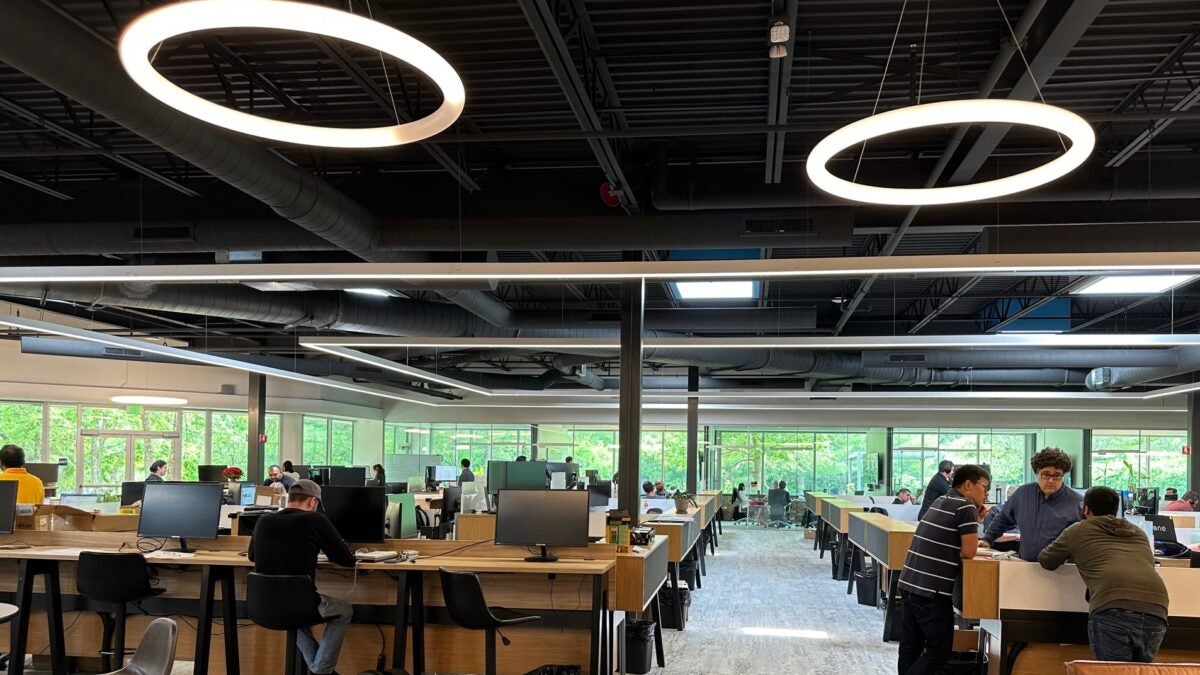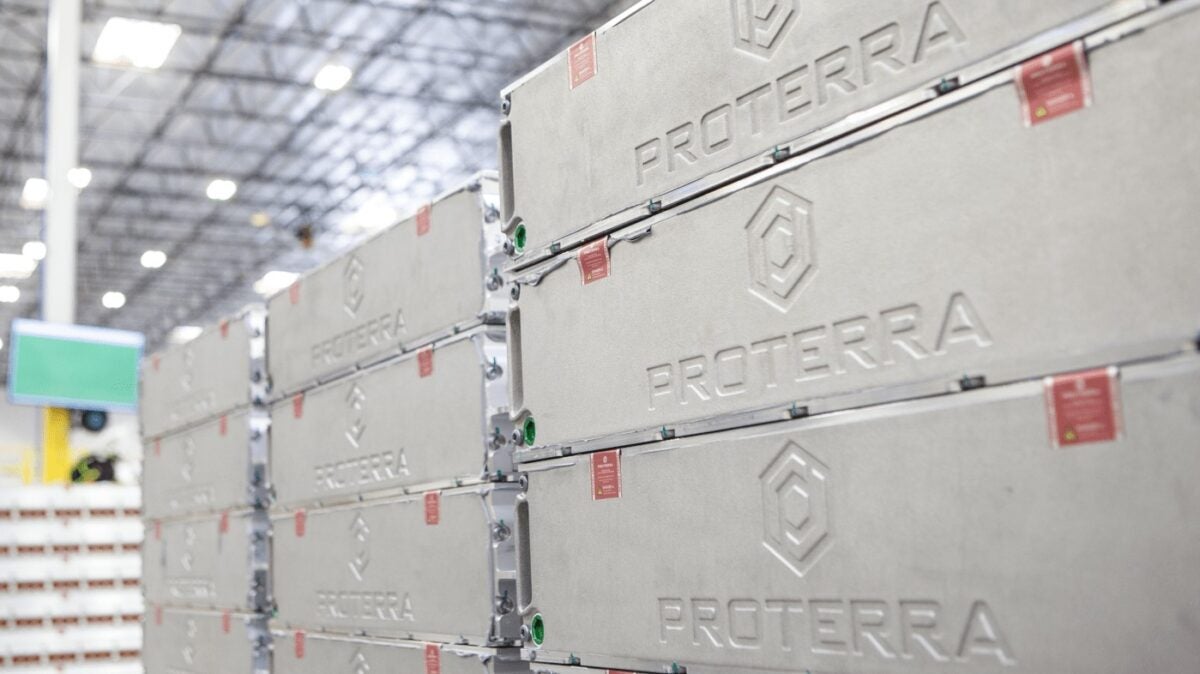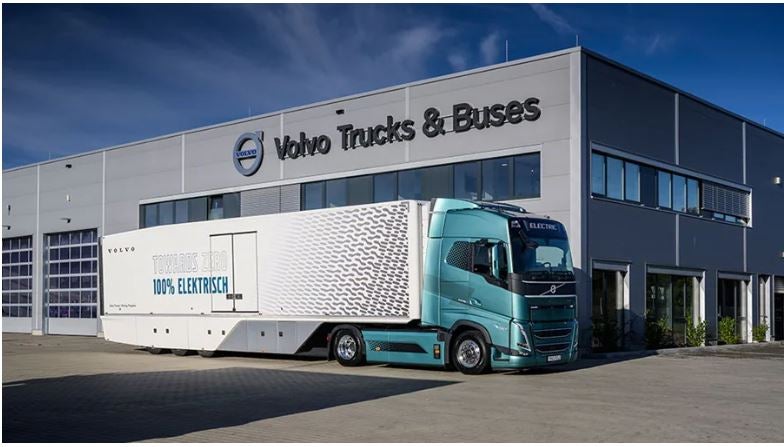If battery-operated electric trucks are to have more uses than regional and drayage hauling, it will take a breakthrough in the energy density of batteries so they can travel more than 250-300 miles on a single charge. Solid-state batteries, which have solid semiconductors as opposed to electron tubes, show great promise.
Toyota Motor Corp. said this week it expects to begin producing solid-state batteries by 2027, promising a single-charge range exceeding 600 miles. That’s for passenger vehicles, not trucks. But just as Toyota Motor North America makes a heavy-duty fuel cell module for commercial trucks, what is to stop it from developing solid-state truck batteries? It has more than 1,000 patents in the technology.
Toyota is not alone. Volkswagen-backed startup QuantumScape is working on lithium-metal solid-state batteries that it says will charge faster, go farther, last longer and operate more safely than today’s lithium-ion batteries.
ONE solution for batteries
Then there’s startup Our Next Energy (ONE). Founder Mujeeb Ijaz is all-in on lithium-iron-phosphate (LFP) chemistry, which he claims can address range issues while costing less and removing the possibility of overheating and fires.
“We looked at the range of an electric vehicle as being the primary question that people have when they buy an electric car,” he told me during a visit to ONE’s headquarters in Novi, Michigan. “We arrived at the need to move the average from 300 miles up to about 600 miles. At that level, you would capture the full market.”
Again, that’s a passenger vehicle number. What about Class 4-8 vehicles?
“As we move up in range, what that starts to do is develop a pack solution that can offer more energy in a smaller space,” Ijaz said.

Watch the full interview with Ijaz next Wednesday at 4 p.m. EDT on FreightWavesTV.
Proterra leans into NMC batteries for now
Proterra Inc., which uses lithium-ion batteries made of nickel manganese cobalt (NMC), invested $25 million in November in domestic LFP production to enter markets below Classes 4-8, which it presently serves.
“We think that LFP definitely has a place,” CEO Gareth Joyce told me on this week’s Truck Tech episode. “It is a chemistry that would work with certain product applications. But at this point, our prime [approach] is nickel-based chemistry. We still believe that’s where the sweet spot of the commercial vehicle market is.”
Joyce expressed no concern over availability of battery materials, pointing to the company’s long-term contract with South Korea’s LG Energy Solution, which is building a $5.5 billion battery plant in Queen Creek, Arizona. The plant will produce cylindrical cells in a format Proterra uses.
“That’s a really valuable investment in the U.S. economy,” Joyce said. “But we have seen more of this happening through the Inflation Reduction Act. That has helped to ensure that the supply chain is going to get developed as this transformation toward battery-powered commercial vehicles and passenger cars continues to accelerate.”

Trevor Milton breaks nearly 3-year social media silence
After months of beatdowns by investors that generated a delisting warning by the Nasdaq, Nikola Corp. shares are racing higher, including a 29.63% bump on Thursday. The threat of losing its Nasdaq seat later this year would be moot if Nikola’s price stays above $1 for eight more trading sessions.
Convicted Nikola founder Trevor Milton is taking credit for the run-up. In his first social media post in three years on Thursday, he urged shareholders to vote against a proposed doubling of authorized shares, or to change their vote if they already voted in favor.
“The market has spoken since I blocked the extreme dilution proposal,” Milton (or someone with access to his LinkedIn account) wrote. “Nikola now has a chance to avoid being delisted or suffer a reverse split thanks to my vote and all those who voted NO.”
Milton was convicted in October of three federal securities fraud counts for lying about the company’s technology accomplishments and prowess. He said he voted 50 million shares against Proposal 2 and all other proposals for the June 7 virtual annual meeting. As of March 31, Milton owned 8.8% of Nikola’s outstanding shares, according to the company’s first-quarter 10-Q report.
Nikola needs more votes to pass Proposal 2
Nikola said June 7 that of the votes cast on Proposal 2, 77% were in favor, insufficient to pass the proposal. It needs 50% of total potential votes, or the proxies of 400 million shares plus one. The company declined to reveal how Milton voted his shares, which amount to 7.5% of all outstanding shares.
The annual meeting was adjourned until July 6 when an updated vote count will be released. If that vote comes up short, Nikola will likely prevail anyway. In August, the state of Delaware, where Nikola is incorporated, will change its rules on shareholder proposals, requiring just a majority of votes cast to pass.
A reverse stock split, which Nikola said is a possibility, would reduce the overall number of shares while assigning an artificially higher price. Nikola lacks the cash to pay interest on a $200 million hedge fund loan. Without the new shares, it could default on the loan and edge nearer to failure.
The advance of Nikola Corp. (Nasdaq: NKLA) shares since June 6
| Date | Open | High | Low | Close* | Volume | |
| June 15 | 1.2300 | 1.8300 | 1.1800 | 1.4000 | 277,096,632 | |
| June 14 | 1.0500 | 1.1750 | 0.9900 | 1.0800 | 119,997,200 | |
| June 13 | 0.8000 | 0.9600 | 0.7520 | 0.9140 | 128,579,800 | |
| June 12 | 0.7710 | 0.8000 | 0.7310 | 0.7660 | 59,306,900 | |
| June 9 | 0.6400 | 0.7250 | 0.6400 | 0.7050 | 69,982,100 | |
| June 8 | 0.5870 | 0.6550 | 0.5820 | 0.6090 | 56,063,800 | |
| June 7 | 0.5580 | 0.6000 | 0.5410 | 0.5930 | 41,481,900 | |
| June 6 | 0.5570 | 0.5700 | 0.5210 | 0.5420 | 44,064,500 |
Briefly noted …
Phillips Connect is offering four IoT — Internet of Trailers — kits to convert trailers to allow real-time diagnostics, fault detection and trend reporting.
The market for recycling electric vehicle batteries could reach $10.45 billion by 2030, according to new research.
Tier 1 automotive supplier BorgWarner Inc. expects to complete the spinoff of its fuel system and aftermarket business Phinia on July 3.
Peterbilt is offering Off-Road Calibration and Rock-Free Mode options for Peterbilt Models 579, 567, 589, 389, 367 and 365 with the Paccar TX-18 PRO automated transmission.
Mullen Automotive Inc. is developing a lightweight truck body for its Class 3 EV with Phenix Truck Bodies & Van Equipment.
Global logistics leader A.P. Moller Maersk is adding 25 Volvo FH electric trucks to its operations in Germany following the purchase of 110 Volvo VNR Electric trucks in the U.S. in March 2022.

Global automaker Stellantis is investing in Nauto, the AI and computer vision technology company that leverages advanced risk data science for safer driving.
Swedish autonomous and electric trucking startup Einride is expanding into neighboring Norway with plans for 35 electric trucks to be in use by June 2024.

That’s it for this week. Thanks for reading. Click here to get Truck Tech via email on Fridays. And tune in to Truck Tech on FreightWavesTV on Wednesdays at 4 p.m. EDT.
We have two Truck Tech shows next week. In our regular slot on Wednesday, we’ll talk with Mujeeb Ijaz, founder and CEO of battery startup Our Next Energy. Then on Thursday at the Future of Supply Chain live event in Cleveland, we’ll be joined by guests from autonomous trucking software developer Torc Robotics and truck-as-a-service startup Voltera.








RICHARD CLEMENTS
B20 BIODIESEL 20% IS AN INSTANT 17% REDUCTION IN CO2 EMMISIONS. COST TO TRANSITION….”ZERO DOLLARS”. THATS RIGHT THE COST IS ZERO DOLLARS. LACT OF KNOWLEDGE IS THE MAIN OBSTICLE. THE ONLY MODIFICATIONS ARE IN THE MINDSET OF THE DEISEL CONSUMER. MANY TALK SMACK ABOUT SAVING THE ENVIRONMENT YET THEY DO NOT USE WHATS AVAILABLE TODAY AND ITS IMPROVED VERSIONS IN THE NEAR FUTURE . I AM REFERRING TO B20 BIODEISEL AND WHATS KNOWN AS R80 CARBON NEUTRAL FUEL. YOU CANNOT GET TO 100 MPH WITHOUT PASSING 20, 30, 40, 50, 60, 70, 80, AND 90 MPH! THE DESIRE TO GO FROM CURRENT PETRO DEISEL TO EV’S THAT ALSO INDERICTLY USE PETRO OILS IN MANY CASES TO MAKE POWER ON THE GRID, DO NOT HAVE THE RANGE TO PERFORM, ARE WAY TO EXPENSIVE, AND WITH NO REAL SOLUTIONS AS TO WHAT WE DO WITH MASSIVE AMOUNTS OF SPENT BATTERIES IN 5 YEARS, (REMEMBER THE SUPERFUNDS).
AS A TRUCKING CO OWNER I ALMOST WENT INTO ANAPOLACTIC SHOCK WHEN I SAW WHAT IS AVAILABLE IN ALTERNATIVE DIESEL FUELS AS OF THIS MINUTE TODAY AT NO COST FOR TRANSITION. THERE IS ONLY CRICKETS.
RICHARD CLEMENTS
THE SIMPLE TRUTH IS THAT BATTERY OPERATED TRUCKS EXPECT SHIPPERS AND TRUCKING CO’S TO TAYLOR THEIR OPERATIONS TO THE TRUCK WHEN THE TRUCK MANUFACTURERS ARE NOT TAYLORING THEIR TRUCKS TO FIT THE NEEDS OF THE TRUCKER’S AND SHIPPER’S.
ITS ALL VERY SIMPLE. BIO DEISEL AND RENEWABLE DEISEL UNTIL ELECTRICAL OVERCOMES ITS MANY LIMITATIONS AND THE PRICE COMES TO EARTH. (RENEWABLE R80 IS CARBON NEUTRAL AS IS 100% BIODEISEL AND IS A COST EFFECTIVE TRANSITION.) YOU WILL NEVER SEE A FOOTBALL GAME WHERE THE RUNNER GOES FROM THE 50 YARD LINE ….BYPASSING THE 40, 30, 20 AND 10 FOR A TOUCHDOWN….IT IS ALWAYS 50, 49, 48, 47, 46 ECT. ONLY IN THE GAME WORLD DO THESE DEFIANCES OF THE LAWS OF PHYSICS EXIST.
USE THE BIO AND RENEWABLE DEISEL….DEVELOPE THE ELECTRICAL.